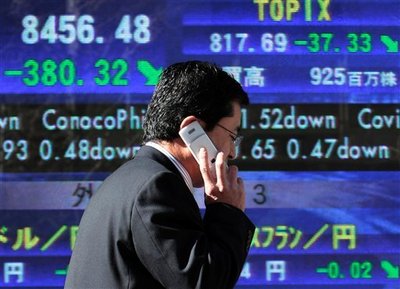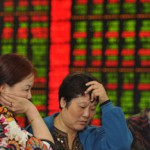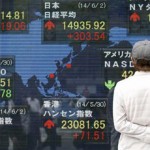Asian stock markets end lower; economic data in focus

Asian equities ended lower on Wednesday as major markets such as Japan and China released economic data.
Oil prices also ticked up during Asian trading session after closing near six-year lows overnight. The U.S. West Texas Intermediate (WTI) crude futures were up 68 cents or 1.81 percent at $38.20 a barrel. Globally traded Brent futures were higher by 53 cents or 1.32 percent at $40.79 a barrel.
U.S. markets closed in the red. The Dow Jones Industrial Averagedropped 162.51 points or 0.92 percent to 17,568. The S&P 500 was down 13.48 points or 0.65 percent at 2,063.59 while the Nasdaq ended near flat, down 3.57 points or 0.07 percent at 5,098.24.
Nikkei down despite strong economic data; Kospi trades higher
Japan posted two consecutive days of positive economic data. On Tuesday, the revised third quarter gross domestic product (GDP), the broadest measure of economic health, number showed the economy was not in technical recession as indicated by the preliminary data.
On Wednesday, October core machinery orders, a measure of capital spending in the economy, rose unexpectedly by 10.7 percent on-month, against a Reuters poll of economists that predicted a 1.5 percent decline. Core machinery orders rose 10.3 percent on-year, also beating expectations.
Market reaction, however, was modest as the spillover effect of low commodity prices pushed the Nikkei 225 down 151 points or 0.78 percent at 19,341.
Manufacturing stocks traded lower despite positive economic data. Shares in Hitachi Construction were down 0.48 percent while Komatsupared losses to remain unchanged.
Japanese blue chips were mostly down, with shares in Sony andMitsubishi Electric seeing losses of more than 1 percent each.
Elsewhere, the Nikkei reported that Japan’s fiance ministry would ramp up issuance of 40-year government bonds in the next fiscal year to reduce the risk of debt-servicing costs eating into the country’s finances.
In South Korea, markets traded flat, with the Kospi up 1.23 points or 0.06 percent at 1,950.
Shares in Lotte Shopping traded 4.44 percent higher after news broke that its parent company, Lotte Group, would consider listing its Japanese confectionery business in the Japan stock market.
South Korean blue chips traded mixed with shares in Samsung Electronics up by 0.48 percent.
Chinese stocks trade mixed, data, yuan mid-point in focus
Chinese markets traded mixed in the morning session after the People’s Bank of China (PBOC) set the mid-point rate for the yuan at its lowest level in more than four years.
The yuan’s mid-point was set at 6.414 per dollar, its lowest since August 2011, compared with 6.4078 on Tuesday. China’s central bank lets the yuan spot rate rise or fall a maximum of 2 percent against the dollar relative to the official fixing rate.
The yuan traded lower at 6.423 against the dollar.
Reaction in the market was muted with the Shanghai Compositetrading 23 points or 0.65 percent higher at 3,492 by mid-morning. The smaller Shenzhen Composite was up 6.8 points or 0.3 percent at 2,228.
Chinese brokerages were trading in the green, up between 0.95 and 2.08 percent. Banks, properties, and energy plays were all in positive territory. Shares in Vanke were up by 6.3 percent.
China also released its November inflation numbers. The consumer price index (CPI) was up 1.5 percent on year, slightly beating expectations, while the producer price index (PPI) was down 5.9 percent on-year, in line with a Reuters poll.
Michelle Lam, economist at Lombard Street Research told CNBC’s “Asia Squawk Box”, “You’re seeing this diverging development in the industrial sector and the consumption sector.”
“Consumption, if you look at retail sales figures, seems to have been holding out relatively well,” she said. The PPI deflation, Lam added, was a symptom of China’s overcapacity problem, necessary to allow market forces to squeeze out less profitable companies.
Australian market closed lower
The ASX 200 closed down 28 point or 0.55 percent at 5,080.
The energy sector saw a bounce back, trading up 0.62 percent, despite low oil prices. Shares in Santos was up 5.74 percent, Woodside Petroleum was up 0.52 percent and Oil Search traded 0.95 percent higher.
Gold stocks mostly were up between 2.27 and 6.11 percent, as gold traded at $1,075 an ounce. Shares in Kingsgate, however, closed the session with over 7.8 percent losses.
Miners and resources producers ended mixed as a result. Iron ore prices were at $38.65 a tonne.
Iron ore producer Fortescue was up 0.83 percent, Mount Gibson closed 2.86 percent higher while Atlas Iron and BC Iron finished unchanged.
Australia’s two biggest miners Rio Tinto and BHP Billiton traded mixed; Rio Tinto was down 0.83 percent while BHP pared early losses and finished 0.65 percent higher. Overnight one of the world’s biggest miners, Anglo American, suspended dividend payments and announced it would cut 85,000 jobs over the next several years as low commodities prices weighed on revenue.
Lucas wrote, “The fall out of Anglo-American will spread through the big five,” including BHP Billiton, which said last month it would maintain its progressive dividend policy.
Elsewhere, Myanmar will launch the country’s first stock exchange as part of its rapid modernization efforts. The Yangon Stock Exchange is a reported $24 million investment, funded by state-owned Myanmar Economic Bank, Daiwa Securities and Japan Exchange Group, which operates the Tokyo Stock Exchange.
Source: CNBC – Asian stock markets end lower; economic data in focus





























